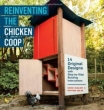Starting with poultry
Don't be put off by the chapters in poultry-keeping books that list all of the pests, diseases, ailments and bad habits to which hens can succumb (they have to fill all those pages with something!). In our experience, commonsense and doing the basics well goes a long way to ensuring a happy, healthy flock.
That said, there are some very useful publications covering poultry keeping in much more depth than our overview here. You can find those we or others have recommended in the 'further reading' section below.
A word of caution here if you're going to keep hens, or any other livestock for that matter. Keeping poultry is a 365 days per year commitment. If you're not around, then you MUST make arrangements for another responsible person to feed, water and check over the animals. If you can't do this, then stick to fruit and vegetables.
Registering your poulty
Putting the word “livestock” in the introduction in inverted commas is deliberate. Poultry is not regarded by the authorities as “proper” livestock like pigs, cattle or sheep so if you only keep a few hens, then you don't need to register with any official agency.
If you have more than 50 birds, you need to inform the Great Britain Poultry Register. You may also register if you have fewer than 50 birds and the authorities would like you to do so.
Poultry welfare
The Farm Animal Welfare Council and the British Veterinary Association have developed a framework known as the “Five Freedoms” which form a basis for the assessment of animal welfare. These are:
- Freedom from hunger and thirst by ready access to fresh water and a diet to maintain full health and vigour
- Freedom from discomfort by providing an appropriate environment including shelter and a comfortable resting area
- Freedom from pain, injury and disease by prevention or rapid diagnosis and treatment
- Freedom to express normal behaviour by providing sufficient space, proper facilities and company of the animal’s own kind
- Freedom from fear and distress by ensuring conditions and treatment to avoid mental suffering
All good poultry keepers must observe these freedoms. Although legislation covering laying hen welfare tends to exclude small flocks of poultry, the standards, particularly space standards, contained therein and the “Five Freedoms” would be taken into account in the event of any welfare concerns.
Deeds and neighbours
You may want to check the title deeds of your property - many modern houses prohibit poultry keeping. However, even if the title deeds do so, you may wish to take a chance and proceed anyway, on the understanding that you may be required to get rid of the poultry if someone complains.
It is both courteous and sensible to consult with your immediate neighbours at least, prior to committing yourself. The main concerns of neighbours are likely to be noise, smell and rats. Well-managed poultry should not present a problem in any of these areas. If hens aren’t overstocked and are regularly cleaned out, offensive odours will be eliminated.
Although hens do make a noise, and some can be quite vocal, they are mainly noisy when they lay and announce it to the world – the rest of the time, the noise is minimal and what there is, is quite restful. Of course, a cockerel is a different proposition and keeping one is not recommended in a built up area. If feed is properly stored, rodents should not present a problem.
Often promises (if they are kept!) of free-range eggs are enough to win over the neighbours.
- Previous « An Introduction to Poultry Keeping
- Next Buying poultry »

About Rosemary Champion
Rosemary lives on a 12 acre smallholding in Angus, in the east of Scotland, where she keeps Ryeland Sheep, Shetland cattle and assorted poultry. She was destined to be a smallholder from an early age.
Further Reading
 Chicken & Eggs: River Cottage Handbook No.11 Mark Diacono |  Storey's Guide to Raising Chickens Gail Damerow |  A Beginners Guide to Caring for Ex-Batts Jo Barlow |  Reinventing the Chicken Coop Matthew Wolpe |  Chickens: The Essential Guide to Choosing and Keeping Happy, Healthy Hens Suzie Baldwin |
Smallholding shop
When you click links below and make a purchase, this may result in this site earning a commission from eBay.

Lid for 3kg Plastic Poultry Feeder each
Lid for 3Kg feeder.… from £1.97 + p&p

Pheasant Feeder 38cm
Eltex Pheasant Feeder.Holds up… from £40.08 + p&p

Pressed Pulp Egg Box - 6 eggs - pk24
Plain grey pressed… from £4.00 + p&p

Polyprop Feed Scoop medium
1Kg plastic feed scoop. Ideal… from £1.10 + p&p
















